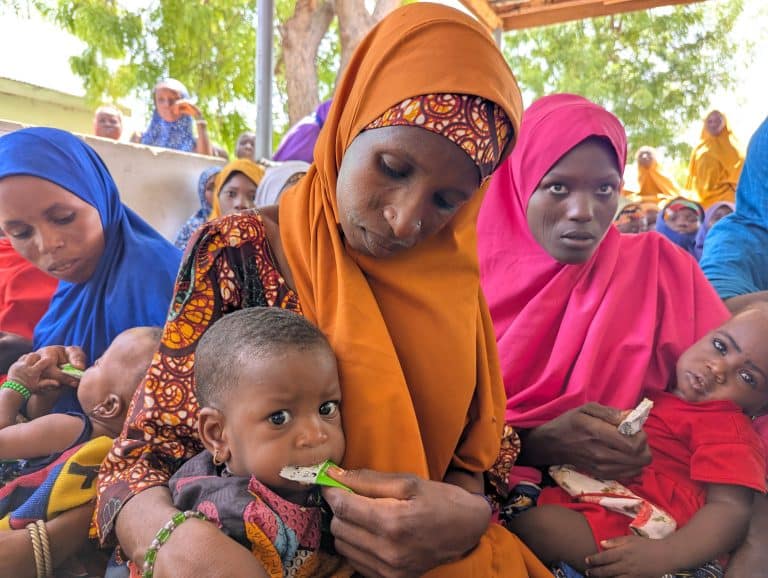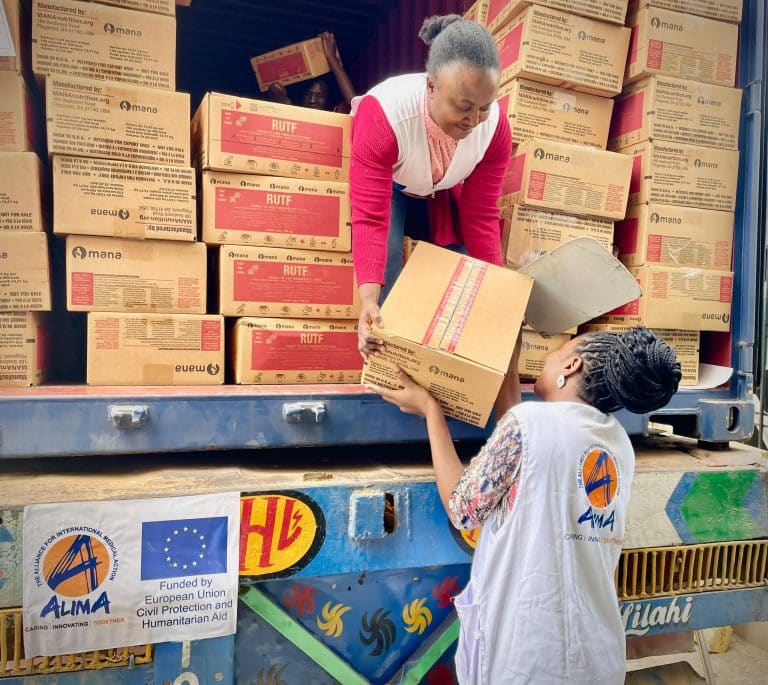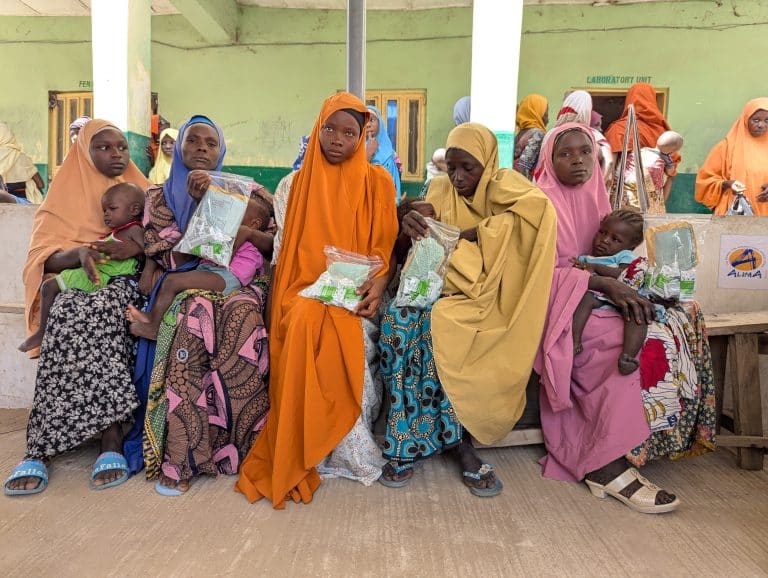Nigeria: ALIMA’s Actions on the Ground
📍 ALIMA presence since: 2016
🛡️ Mission status: ongoing
🏥 Beneficiaries in 2024: 605,688
🔹 Key areas of expertise: Malnutrition | Women’s health | Epidemics and emerging diseases | Research and innovation
Humanitarian situation in Nigeria
Nigeria is facing a major humanitarian crisis exacerbated by armed conflict, food insecurity, and recurring epidemics.
Among the most affected states, Borno, Yobe and Katsina, where ALIMA operates, are the scene of violence perpetrated by armed groups, causing mass displacement and limiting access to essential healthcare. Women and children remain the first victims of this instability.
📌 Key figures of the crisis in Nigeria
- 🌍 Population: 229.2 million (OCHA, 2024)
- 🚨 People in need of humanitarian aid: 7.8 million (OCHA, 2024)
- 🏠 Internally displaced persons and refugees: 3.4 million (UNHCR, 2024)
- 🍽️ People facing severe food insecurity: 32 million (WFP, 2024)
To address these challenges, ALIMA is working to strengthen access to healthcare, treat malnutrition, and respond to epidemics in the most vulnerable regions.
Medical aid and humanitarian response in Nigeria
🥣 Malnutrition and pediatric care
In Borno, Yobe and Katsina states, ALIMA supports several health facilities to treat malnutrition in children under five. The organization is implementing simplified protocols in several centers and promoting access to Centers for Nutritional Recovery (CRENAS).
📊 In 2024, ALIMA treated 68,855 children suffering from severe acute malnutrition.
👩⚕️ Maternal health and childbirth
ALIMA ensures comprehensive pre- and postnatal care for pregnant women through supported health centers. The goal is to reduce maternal mortality and ensure safe childbirth.
📊 In 2024, ALIMA supported 3,596 births in its medical facilities.
🦠 Epidemic response: prevention and management
In response to recurrent outbreaks of cholera and Lassa fever, ALIMA is strengthening epidemiological surveillance, setting up specialized treatment centers and raising awareness to promote prevention.
📊 In 2024, ALIMA treated 3,574 people with diphtheria, cholera, measles, and Lassa fever.
🚑 Emergency care for displaced populations
In a country marked by conflict and massive displacement, ALIMA is deploying emergency medical units to ensure access to life-saving care for the most vulnerable populations.
📊 In 2024, ALIMA provided 69,924 medical consultations for displaced people.
Highlight project: strengthening access to healthcare for displaced people and host communities
🎯 Access to healthcare in Borno, Yobe, and Katsina
In regions impacted by ongoing conflict, this project aims to reduce mortality and improve access to medical and nutritional care for both displaced people and host communities.
📌 Why this project matters
- High demand for medical and nutritional services in areas affected by insecurity.
- Limited access to care for women and children in vulnerable situations.
📌 Project goals
- Provide free, high-quality primary and secondary healthcare.
- Treat severe acute malnutrition in children under five.
- Strengthen the prevention and management of gender-based violence.
- Improve access to hygiene and waste management practices in health facilities.
With this initiative, ALIMA is ensuring that the most affected communities benefit from appropriate and sustainable medical support.
Testimony from the field: vital support for the displaced
I had to flee my home because of the fighting. My son had been sick for a week, and I didn't know where to go. Thanks to ALIMA, he was treated for free. Today, he's better, and I finally feel a sense of hope again.
Amina, displaced mother, Katsina State
Amina and her seven-month-old baby fled escalating violence in search of safety. With no food or assistance, they found help through ALIMA’s emergency response team, offering immediate access to care and essential humanitarian support.
On the ground
Our News from Nigeria

Integrating Nutrition and Immunization in Yobe State: Why NutriVax Matters Now
Communities in Northeast Nigeria face a worsening malnutrition crisis, driven by insecurity, food shortages and limited access to healthcare. In 2025, ALIMA has treated over

ALIMA Strengthens Response to Acute Malnutrition with Lifesaving Nutrition Support for Children When it Matters Most
As child malnutrition continues to escalate in Nigeria, the European Union (EU) has funded the shipment of 20,000 boxes of Ready to Use Therapeutic Food

NutriVax: Integrating Nutrition and Vaccination to Save Children’s Lives in Nigeria
Every year, millions of children in Africa are trapped in a vicious cycle of malnutrition and infectious diseases. But what if we could fight both


